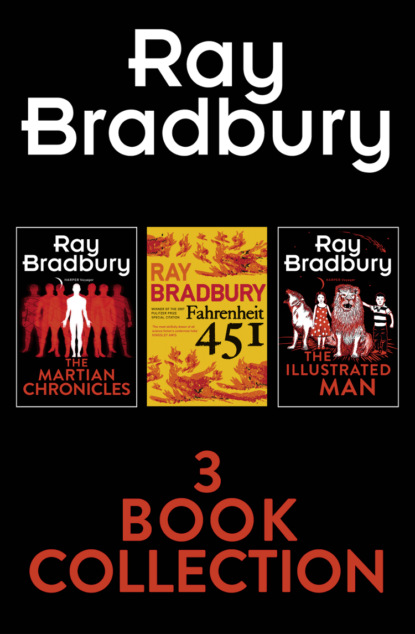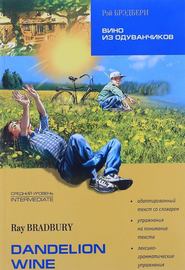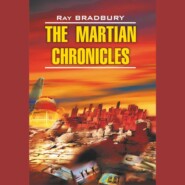По всем вопросам обращайтесь на: info@litportal.ru
(©) 2003-2024.
✖
Ray Bradbury 3-Book Collection: Fahrenheit 451, The Martian Chronicles, The Illustrated Man
Автор
Год написания книги
2019
Настройки чтения
Размер шрифта
Высота строк
Поля
He felt his heel bump land, touch pebbles and rocks, scrape sand. The river had moved him toward shore.
He looked in at the great black creature without eyes or light, without shape, with only a size that went a thousand miles without wanting to stop, with its grass hills and forests that were waiting for him.
He hesitated to leave the comforting flow of the water. He expected the Hound there. Suddenly the trees might blow under a great wind of helicopters.
But there was only the normal autumn wind high up, going by like another river. Why wasn’t the Hound running? Why had the search veered inland? Montag listened. Nothing. Nothing.
Millie, he thought. All this country here. Listen to it! Nothing and nothing. So much silence, Millie, I wonder how you’d take it? Would you shout Shut up, shut up! Millie, Millie. And he was sad.
Millie was not here and the Hound was not here, but the dry smell of hay blowing from some distant field put Montag on the land. He remembered a farm he had visited when he was very young, one of the rare times he had discovered that somewhere behind the seven veils of unreality, beyond the walls of parlours and beyond the tin moat of the city, cows chewed grass and pigs sat in warm ponds at noon and dogs barked after white sheep on a hill.
Now, the dry smell of hay, the motion of the waters, made him think of sleeping in fresh hay in a lonely barn away from the loud highways, behind a quiet farmhouse, and under an ancient windmill that whirred like the sound of the passing years overhead. He lay in the high barn loft all night, listening to distant animals and insects and trees, the little motions and stirrings.
During the night, he thought, below the loft, he would hear a sound like feet moving, perhaps. He would tense and sit up. The sound would move away. He would lie back and look out of the loft window, very late in the night, and see the lights go out in the farmhouse itself, until a very young and beautiful woman would sit in an unlit window, braiding her hair. It would be hard to see her, but her face would be like the face of the girl so long ago in his past now, so very long ago, the girl who had known the weather and never been burned by the fireflies, the girl who had known what dandelions meant rubbed off on your chin. Then, she would be gone from the warm window and appear again upstairs in her moon-whitened room. And then, to the sound of death, the sound of the jets cutting the sky into two black pieces beyond the horizon, he would lie in the loft, hidden and safe, watching those strange new stars over the rim of the earth, fleeing from the soft colour of dawn.
In the morning he would not have needed sleep, for all the warm odours and sights of a complete country night would have rested and slept him while his eyes were wide and his mouth, when he thought to test it, was half a smile.
And there at the bottom of the hayloft stair, waiting for him, would be the incredible thing. He would step carefully down, in the pink light of early morning, so fully aware of the world that he would be afraid, and stand over the small miracle and at last bend to touch it.
A cool glass of fresh milk, and a few apples and pears laid at the foot of the steps.
This was all he wanted now. Some sign that the immense world would accept him and give him the long time needed to think all the things that must be thought.
A glass of milk, an apple, a pear.
He stepped from the river.
The land rushed at him, a tidal wave. He was crushed by darkness and the look of the country and the million odours on a wind that iced his body. He fell back under the breaking curve of darkness and sound and smell, his ears roaring. He whirled. The stars poured over his sight like flaming meteors. He wanted to plunge in the river again and let it idle him safely on down somewhere. This dark land rising was like that day in his childhood, swimming, when from nowhere the largest wave in the history of remembering slammed him down in salt and mud and green darkness, water burning mouth and nose, retching his stomach, screaming! Too much water!
Too much land!
Out of the black wall before him, a whisper. A shape. In the shape, two eyes. The night looking at him. The forest, seeing him.
The Hound!
After all the running and rushing and sweating it out and half-drowning, to come this far, work this hard, and think yourself safe and sigh with relief and come out on the land at last only to find …
The Hound!
Montag gave one last agonized shout as if this were too much for any man.
The shape exploded away. The eyes vanished. The leaf-piles flew up in a dry shower.
Montag was alone in the wilderness.
A deer. He smelled the heavy musk-like perfume mingled with blood and the gummed exhalation of the animal’s breath, all cardamon and moss and ragweed odour in this huge night where the trees ran at him, pulled away, ran, pulled away, to the pulse of the heart behind his eyes.
There must have been a billion leaves on the land; he waded in them, a dry river smelling of hot cloves and warm dust. And the other smells! There was a smell like a cut potato from all the land, raw and cold and white from having the moon on it most of the night. There was a smell like pickles from a bottle and a smell like parsley on the table at home. There was a faint yellow odour like mustard from a jar. There was a smell like carnations from the yard next door. He put down his hand and felt a weed rise up like a child brushing him. His fingers smelled of liquorice.
He stood breathing, and the more he breathed the land in, the more he was filled up with all the details of the land. He was not empty. There was more than enough here to fill him. There would always be more than enough.
He walked in the shallow tide of leaves, stumbling.
And in the middle of the strangeness, a familiarity.
His foot hit something that rang dully.
He moved his hand on the ground, a yard this way, a yard that.
The railroad track.
The track that came out of the city and rusted across the land, through forests and woods, deserted now, by the river.
Here was the path to wherever he was going. Here was the single familiar thing, the magic charm he might need a little while, to touch, to feel beneath his feet, as he moved on into the bramble bushes and the lakes of smelling and feeling and touching, among the whispers and the blowing down of leaves.
He walked on the track.
And he was surprised to learn how certain he suddenly was of a single fact he could not prove.
Once, long ago, Clarisse had walked here, where he was walking now.
Half an hour later, cold, and moving carefully on the tracks, fully aware of his entire body, his face, his mouth, his eyes stuffed with blackness, his ears stuffed with sound, his legs prickled with burrs and nettles, he saw the fire ahead.
The fire was gone, then back again, like a winking eye. He stopped, afraid he might blow the fire out with a single breath. But the fire was there and he approached warily, from a long way off. It took the better part of fifteen minutes before he drew very close indeed to it, and then he stood looking at it from cover. That small motion, the white and red colour, a strange fire because it meant a different thing to him.
It was not burning; it was warming!
He saw many hands held to its warmth, hands without arms, hidden in darkness. Above the hands, motionless faces that were only moved and tossed and flickered with firelight. He hadn’t known fire could look this way. He had never thought in his life that it could give as well as take. Even its smell was different.
Вы ознакомились с фрагментом книги.
Приобретайте полный текст книги у нашего партнера:
Приобретайте полный текст книги у нашего партнера:

















